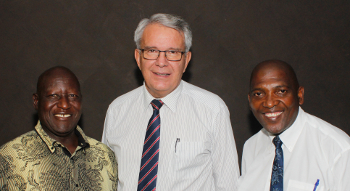Latest News Archive
Please select Category, Year, and then Month to display items
23 September 2020
|
Story Nitha Ramnath
|
Photo Supplied
 UFS students will be performing at the virtual ICDF on 24 September 2020.
UFS students will be performing at the virtual ICDF on 24 September 2020.
On 24 September 2020, South Africa will be celebrating Heritage Day. For the 25th anniversary of this celebration, South Africans are encouraged to celebrate their culture and the diversity of their beliefs and traditions in the wider context of a country that belongs to all its people. Dr Chitja Twala, Vice-Dean: Faculty of the Humanities at the UFS, says: “The importance of the day is that we must celebrate who we are and learn from each other.” The University of the Free
State (UFS) has a long tradition of commemorating Heritage Day and the ideas underpinning it. One way in which the UFS celebrates and recognises the tapestry of diverse cultures represented on its campuses is through its International Cultural Diversity
Festival hosted by the Office for International Affairs. The purpose of the event is to highlight on Heritage Day that international cultural diversity is a central tenet of the UFS community.
Pursuant to the tremendous challenges caused by the COVID-19 pandemic globally, the International Cultural Diversity Festival will this year be celebrated in a virtual format. Even during this uncertain time, it is important to find time to celebrate
our uniqueness and to appreciate one another’s heritage and culture in the spirit of our humanity.
Date: 24 September 2020
Time: 10:00
No registration is required!
For the 2020 Heritage Month celebrations, let us share elements about ourselves that make us proud of who we are! The diverse contributions to the 2020 virtual International Cultural Diversity Festival activities will highlight the university’s commitment towards creating a diverse, challenging intellectual environment. As a research-led university, the UFS strives to provide an environment in which new ideas are incubated and debated, contributing to its transformation process and African unity.
For more information contact Bulelwa Moikwatlhai on MaloB@ufs.ac.za
New developments in the Faculty of Theology and Religion
2017-08-30

Bishop JM Khumalo, Apostolic Church of
Christ; Prof Fanie Snyman, Dean of the
Faculty of Theology and Religion; and
Rev Simon Galada, Wesleyan Church,
at the faculty’s official opening in
February 2017.
Photo: Eugene Seegers
At a meeting of the UFS Council last year, a name change was accepted for the Faculty of Theology, renaming it to the Faculty of Theology and Religion. This change signals openness in approach to other religions, in addition to those of Christian denominations. This is a development that took root in Europe a few years ago. Furthermore, a growing field of interest is the study of the impact religion has had and still has, even in highly secularised societies. This name change is the first of its kind in South Africa, which means that the faculty will lead the way in transformation and impact-based religious studies.
Exciting times lie ahead
Prof Fanie Snyman, Dean of the faculty, says of these refinements: “The new name and restructuring of departments will lead to a new synergy that will have an impact on our teaching and research in the faculty. Exciting times lie ahead for the Faculty of Theology and Religion!”
Apart from the change in the name of the faculty, departments within the faculty were also regrouped, with new names. The Departments of Old Testament and New Testament merged to become the Department of Old and New Testament Studies, while the Departments of Systematic Theology and Ecclesiology merged and will now be known as the Department of Historical and Constructive Theology. The former Departments of Practical Theology and Missiology became the Department of Practical and Missional Theology. The Department of Religion Studies remained unchanged to emphasise the importance of religion in South Africa and the world at large.
Error! Hyperlink reference not valid.
Distinction of theological disciplines
The rationale for these groupings is the distinction of theological disciplines in terms of the study of texts (Old and New Testament), sources (Systematic Theology and Church History), and practices (Practical Theology and Missiology). One benefit of these newly-constructed departments is that they will be more cost-effective, but the more important advantage is that this will stimulate discussion and research across the various theological disciplines.